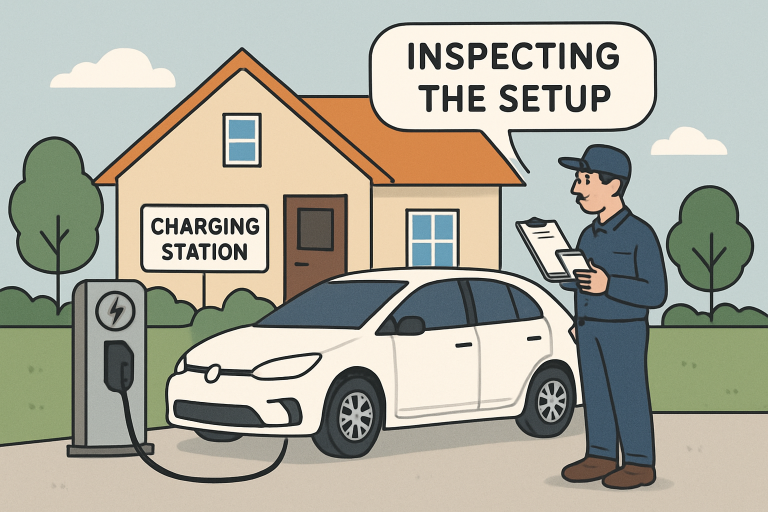Key Takeaways
- Hire a licensed electrician for expert, code-compliant installation of your EV charging station.
- Assess your home’s electrical capacity before installation to prevent overloads and hazards.
- Understand different charger types and select the right model for your needs.
- Routine maintenance maximizes the safety and reliability of your charging station.
Table of Contents
- Importance of Hiring a Licensed Electrician
- Assessing Your Home’s Electrical Capacity
- Choosing the Right EV Charger
- Installation Process
- Safety Precautions During Installation
- Maintenance and Upkeep
- Understanding Local Regulations and Permits
- Conclusion

As electric vehicles (EVs) continue to surge in popularity, many homeowners weigh the advantages of installing a dedicated charging station at home. While the convenience and efficiency of charging your EV overnight are appealing, ensuring a safe and code-compliant installation should be the top priority. If you’re considering upgrading your property, you may want to explore reputable Matthews, NC EV charging station installation by licensed electricians to ensure expert service and lasting peace of mind.
Home EV charging installations come with technical and regulatory complexities. From understanding the electrical demands of modern chargers to navigating property-specific requirements and ongoing maintenance, partnering with a licensed professional is critical. This comprehensive guide will walk you through every essential step, empowering you to make informed decisions for your home and vehicle.
Whether you drive a fully electric or plug-in hybrid vehicle, installing a residential charger is an investment in convenience and future savings. But without careful planning and proper installation, you could face safety hazards, unexpected expenses, or even voided warranties. Learning the key considerations before starting your installation project is crucial.
This guide covers everything from evaluating your home’s electrical infrastructure to recognizing the importance of ongoing maintenance. By the end, you’ll know what to expect and how to achieve a reliable, code-compliant charging setup.
Importance of Hiring a Licensed Electrician
Installing an EV charging station is a specialized electrical project, requiring knowledge of wiring and voltage, local codes, and safety standards. Licensed electricians are trained to correctly assess and execute these installations, reducing the risk of dangerous wiring mistakes, overloaded circuits, and electrical fires. According to Consumer Reports, professional installation is essential for compliance with your insurance and EV manufacturer’s warranty requirements.
Professional electricians handle site evaluation, technical troubleshooting, and permitting, providing peace of mind and legal protection. They can also offer guidance on affordable upgrades if your current electrical system cannot support the power demands of a modern EV charger.
Assessing Your Home’s Electrical Capacity
Before purchasing or installing a charger, it’s critical to determine whether your existing electrical panel can safely handle the added load. Many older homes were built long before EV charging was a consideration, and may require expensive panel upgrades or the addition of a dedicated 240-volt circuit. Skipping this assessment could result in system overloads or power outages, putting your family and investment at risk.
Licensed electricians perform load calculations, examine panel capacity, and check wiring integrity to ensure your installation is safe and scalable. They may recommend energy management solutions if your property houses multiple large appliances or is already close to its service limit.
Choosing the Right EV Charger
Chargers are typically classified based on their voltage and speed. Level 1 chargers use a standard 120-volt outlet suitable for drivers with modest daily mileage, offering slower, overnight replenishment. Level 2 chargers on a 240-volt outlet deliver much faster charging – ideal for daily commuters and multi-driver households. When selecting the proper charger, consider your driving routine, the range of your EV, and whether you plan to upgrade vehicles in the future. Sites like Wirecutter offer reviews of the best EV chargers for home use.
Installation Process
- Site Assessment: The certified electrician will determine the ideal charger placement, prioritizing proximity to your electrical panel and garage or parking area.
- Electrical Upgrades: If necessary, panel or wiring upgrades will be completed to accommodate the charger’s requirements and meet building codes.
- Mounting and Wiring: The charger is mounted, wiring is run, and safety devices such as circuit breakers and disconnect switches are installed.
- Testing: A thorough system check ensures the charger operates as intended and that no faults or hazards are present.
Safety Precautions During Installation
EV charging installations present unique safety risks. All charging stations should be properly grounded and connected via dedicated circuits with Ground Fault Circuit Interrupter (GFCI) protection. Outdoor chargers require weather-resistant enclosures and watertight seals. Avoiding DIY installation is among the most crucial safety measures a homeowner can take. Professionals will also ensure adherence to the National Electrical Code (NEC), which governs all residential electrical work in the U.S.
Maintenance and Upkeep
Long-term safety and efficiency depend on maintaining your charging station well. This means scheduling regular inspections with your electrician to check for loose fittings, corrosion, or wear and tear, especially if the charger is outdoors. Keeping the charger and surrounding area clean, dry, and free from blockages will minimize risks and support trouble-free operation for years.
Understanding Local Regulations and Permits
Most states and local jurisdictions require permits for residential EV charging installations to ensure compliance with safety standards and zoning laws. Permit applications may involve providing specs for your charger and showing its location on site plans. Your licensed electrician should assist with or handle the permitting process, ensuring all work is inspected and approved by the proper authorities. Compliance guarantees you can use your charging station legally and safely.
Conclusion
Installing a home EV charging station represents a meaningful step towards sustainable living and the future of transportation. By engaging a licensed electrician for a thorough assessment, proper installation, and routine upkeep, you’ll enjoy reliable charging, protect your property, and maximize the long-term value of your electric vehicle investment. Safety, compliance, and expert guidance are the foundation of every successful installation.



